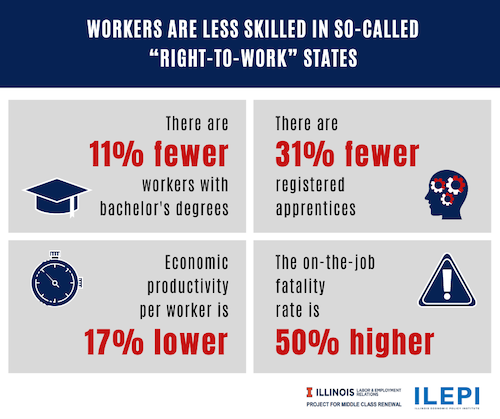Posted:
Tuesday, April 11, 2023
On Tuesday, March 14, the Michigan State Senate approved a bill that would repeal the state “Right to Work” (RTW) law that had been in effect in Michigan since 2012. The bill will soon move to the Michigan State House of Representatives where it is expected to pass and then be sent to the state Governor to be signed into law.
To be sure, the repeal of the RTW law in Michigan has a far lower impact on unions today because of the 2018 United State Supreme Court Ruling in the Janus v. American Federation of State, County and Municipal Employees (AFSCME), Council 31, et. al. case. In that ruling, the Supreme Court stated that employees who were part of a bargaining unit, such as a union, and received the benefits of a contract negotiated by that bargaining unit, were not required to pay dues or agency fees to that bargaining unit or maintain membership in that bargaining unit. In essence, the Janus ruling gave workers the option to not pay union dues or agency fees regardless of the presence of a RTW law in their state. That being said, the repeal of the statewide RTW law can and will have benefits to Michigan unions, moving forward.
In the future, legal challenges to the Supreme Court ruling in Janus could result in changes to federal law regarding agency fee requirements and could return the decision on such matters back to individual states. In that situation, a repeal of RTW in Michigan would prohibit individuals from benefitting from union negotiated contracts while not paying the dues that support the negotiation and administration of that contract. In addition, the repeal of the RTW law makes it far less likely that business owners will attempt to negotiate with members separate from those negotiating on behalf of the whole bargaining unit.
Since RTW legislation was passed in Michigan, union membership dropped from 17.1 percent of the workforce to 15.3 percent of the workforce, and manufacturing wages in union shops have failed to keep pace with the rate of inflation. In fact, wage growth overall in Michigan ranks 31st in the nation since the RTW law was enacted in 2012.

According to a study published in 2021 by the Illinois Economic Policy Institute and the Project for Middle Class Renewal at the University of Illinois at Urbana-Champaign, states that have passed RTW laws have experienced slower economic growth, lower wages, higher consumer debt, worse health outcomes and lower levels of civic participation over the past 15 years as compared with states that do not have such laws. According to the analysis, states with RTW laws have 3% lower hourly wages on average, 5% less health insurance coverage and 8% less retirement security.
You can read more about the report by clicking the link below:
Found in:
 2017 NYSUT Communications Award - Best Website
2017 NYSUT Communications Award - Best Website
